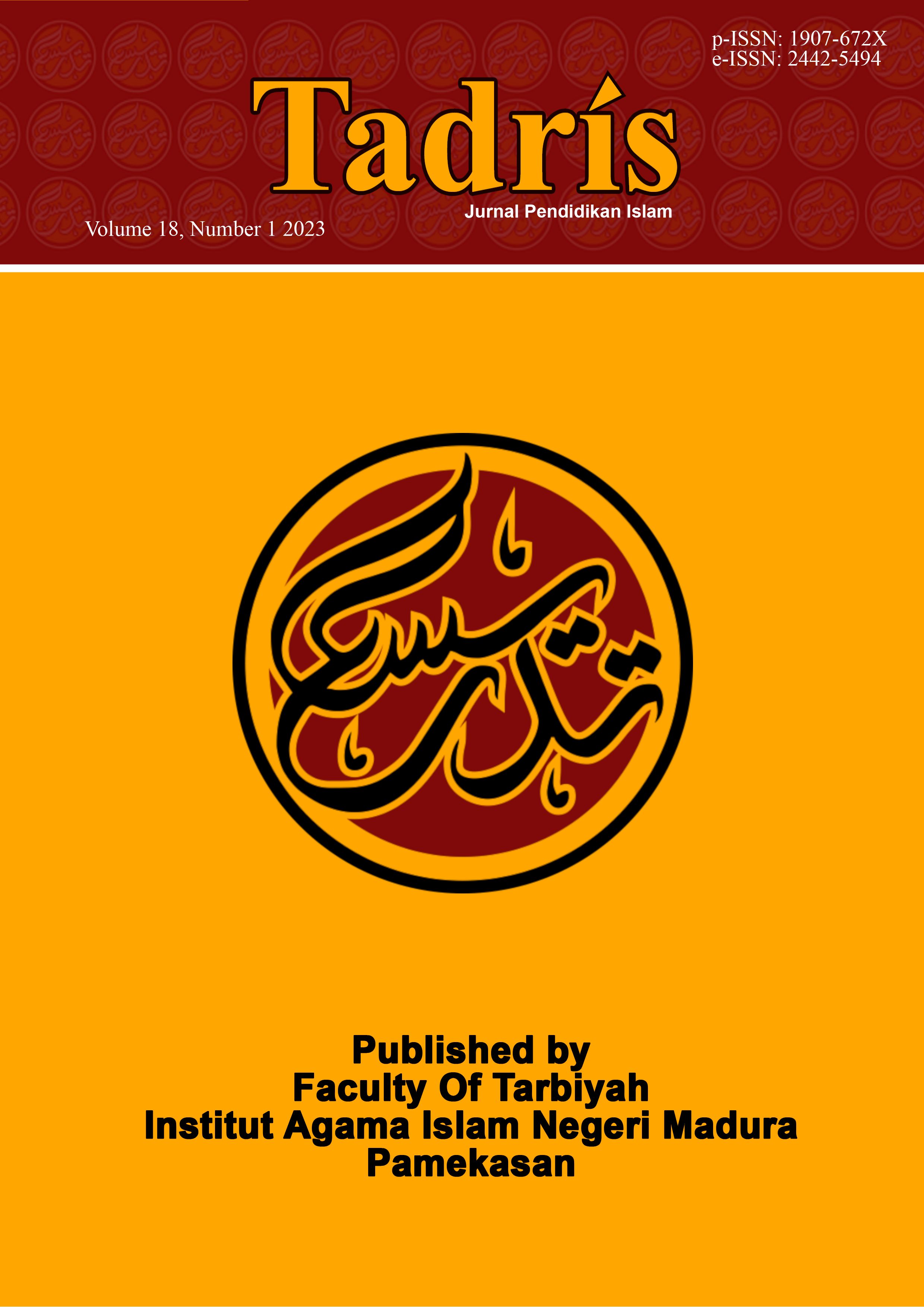The Transcendence Dimensions of Prophetic Leadership
 Abstract views: 325
,
Abstract views: 325
,
 PDF downloads: 187
PDF downloads: 187
Abstract
This study examines the traces of Kiai Abdul Wahid Khudzaifah's life and his role as a pioneer and public figure as well as his transcendence dimension prophetically influence character development as spirit and personality of the Santri (students). This study uses a descriptive approach with data collection techniques of interviews, participant Kiai, Leadership; Transcendence; Character Development; Santri observation, and documentation. This research aims to, firstly, describe the life of Kiai Abdul Wahid Khudzaifah when he was in the Islamic boarding school; secondly, to describe the role of Kiai Abdul Wahid Khudzaifah as a pioneer in establishing educational institutions, as a great figure in mass organizations and his wisdom as Murshid Thoriqah Naqsyabandiyah Ahmadiyah Mudzhariyah; and the last, to describe the prophetic transcendence dimension of Kiai Abdul Wahid Khudzaifah's leadership in influencing character development as spirit and personality of the students in managing Islamic Education. The results showed that, firstly, Kiai Abdul Wahid Khudzaifah was a scholar who produced works related to religion, Sufism, and language. Second, Kiai Abdul Wahid Khudzaifah plays and works his role well as a public figure for Islamic Education, the figure of Religious Organization namely Nahdhatul Ulama (NU), as well as Sufi and Murshid figure of Thoriqah Naqsabandiyah Ahmadiyah Mudzhariyah. Third, the behavior and leadership of Kiai Abdul Wahid Khudzaifah, in prophetic transcendent, influence the character development of the students in the form of trustful, patience, sincerity, istiqamah, simplicity and humility, and firmness in his action.
Downloads
References
Anggito, Albi, and Johan Setiawan. Metode Penelitian Kualitatif. Sukabumi: CV Jejak, 2018.
Budiman, Muhammad. Kepemimpinan Islam: Teori Dan Aplikasi. Tasikmalaya: Edu Publisher, 2021.
Caranena, Karen. The Magis of Leadership; Seni Kepemimpinan Yang Menakjubkan. Yogyakarta: Araksa, 2020.
Dewi, Indah Kusuma, and Ali Mashar. Nilai-Nilai Profetik Dalam Kepemimpinan Modern Pada Manajemen Kinerja. Jogjakarta: CV. Gre Publishing, 2019.
Hamid, Noor, and Muhammad Iqbal Juliansyahzen. “Prophetic Leadership in Pesantren Education: Study at Pondok Pesantren Universitas Islam Indonesia.” Jurnal Pendidikan Islam 6, no. 2 (December 27, 2017): 349. https://doi.org/10.14421/jpi.2017.62.349-369.
Haryanto, Cosmat Gatot. Ragam Metode Penelitian Kualitatif Komunikasi. Sukabumi: CV Jejak, 2020.
Johdi Salleh, Mohamad. Educational Leadership Model: An Islamic Perspective. al-Shajarah: Journal of The International Institute of Islamic Thought and Civilization (ISTAC), 2018.
Khasanah, Uswatun. Kepemimpinan Transformasional Dalam Manajemen Pendidikan Islam. Surabaya: Jakad Publishing Surabaya, 2018.
Lincoln, Yonna S, and Egon G Guba. Naturalistic Inquiry. London-New Delhi: Sage Publication Inc, 1985.
Mansyur, Ahmad Yasser. “Personal Prophetic Leadership Sebagai Model Pendidikan Karakter Intrinsik Atasi Korupsi.” Jurnal Pendidikan Karakter 4, no. 1 (March 18, 2013). https://doi.org/10.21831/jpk.v0i1.1284.
Miles, Matthew B, and A. Michael Hubermas. An Expanded Source Book: Qualitative Data Analysis. London: Sage Publication, 1995.
Muhajir, Noeng. Metodologi Penelitian Kualitatif. Yogyakarta: Rakesarasin, 1996.
Muhammad, Nik Maheran Nik. “Prophetic Leadership Model: Conceptualizing a Prophet’s Leadership Behaviour, Leader-Follower Mutuality and Altruism to Decision Making Quality.” European Journal of Interdisciplinary Studies 1, no. 3 (December 30, 2015): 93–106. https://doi.org/10.26417/ejis.v3i1. p93-106.
Oakes, Len. Prophetic Charisma: The Psychology of Revolutionary Religious Personalities. Syracuse University Press, 1997.
Percy, Ian, and Going Deep. Exploring Spirituality in Life and Leadership. Arizona: Inspired Productions Press, 1997.
Rahayuningsih, Tri. “Kepemimpinan Profetik, Budaya Organisasi, dan Komitmen Organisasi Karyawan Universitas Abdurrab.” Jurnal Psikologi 12, no. 2 (April 7, 2017): 117–21. https://doi.org/10.24014/jp.v12i2.3238.
Rifaudin, Machsun. “Konsep Kepemimpinan Profetik Dalam Membangun Sumber Daya Manusia Berbasis Islam Di Perpustakaan.” JIPI (Jurnal Ilmu Perpustakaan dan Informasi) 2, no. 1 (May 30, 2017): 46–62. https://doi.org/10.30829/jipi.v2i1.920.
Rijal, A. S., & Hakim, L. (2021). Etika Tasawuf Guru: Studi Pemikiran Imam al-Ghazali dan Syekh Muhammad Amin al-Kurdi. TADRIS: Jurnal Pendidikan Islam, 16(1), 127-140.
S. Nasution. Metode Penelitian Naturalistik-Kualitatif. Bandung: Tarsito, 1992.
Septiawati, Sriana. “Pengaruh kepemimpinan profetik terhadap kepuasan kerja karyawan di universitas muhammadiyah aceh.” Jurnal Ecopsy 5, no. 1 (April 28, 2018): 8. https://doi.org/10.20527/ecopsy.v5i1.4879.
Sugiyono. Metode Pnelitian Kuantitatif, Kualitatif Dan R & D. Cet. 23. Bandung: Alvabeta, 2016.
Syam, Robingun Suyud El. “Prophetic Leadership: The Leadership Model of Prophet Muhammad in Political Relation of Social – Ummah.” Jurnal Pendidikan Islam 6, no. 2 (December 27, 2017): 371–96. https://doi.org/10.14421/jpi.2017.62.371-396.
Syamsudin, Syamsudin. “Kepemimpinan profetik: Telaah kepemimpinan Umar bin Khattab dan Umar bin Abdul Aziz.” Masters, Universitas Islam Negeri Maulana Malik Ibrahim, 2015. http://etheses.uin-malang.ac.id/3290/.
Taufiqurrohman. “Ikhlas Dalam Perspektif Alquran (Analisis Terhadap Konstruk Ikhlas Melalui Metode Tafsir Tematik).” EduProf 01, no. 02 (2019). https://media.neliti.com/media/publications/319706-ikhlas-dalam-perspektif-alquran-2d054a62.pdf.
Umiarso. Kepemimpinan Transformasional Profetik. Jakarta: Prenadamedia Group, 2018.
———. “Kepemimpinan Transformasional Profetik Dalam Mengembangkan Pesantren Di Kabupaten Jember.” AKADEMIKA: Jurnal Pemikiran Islam 23, no. 1 (August 18, 2018): 87. https://doi.org/10.32332/akademika. v23i1.1205.
Copyright (c) 2023 TADRIS: Jurnal Pendidikan Islam

This work is licensed under a Creative Commons Attribution-NonCommercial 4.0 International License.
The journal operates an Open Access policy under a Creative Commons Non-Commercial 4.0 International license. Authors who publish with this journal agree to the following terms:
- Authors retain copyright and grant the journal right of first publication with the work simultaneously licensed under a
 Commons Attribution-NonCommercial 4.0 International License
Commons Attribution-NonCommercial 4.0 International Licensethat allows others to share — copy and redistribute the material in any medium or format, and adapt — remix, transform, and build upon the material.
- Authors are able to enter into separate, additional contractual arrangements for the non-exclusive distribution of the journal's published version of the work (e.g., post it to an institutional repository or publish it in a book), with an acknowledgement of its initial publication in this journal.
- Authors are permitted and encouraged to post their work online (e.g., in institutional repositories or on their website) prior to and during the submission process, as it can lead to productive exchanges, as well as earlier and greater citation of published work (see The Effect of Open Access).














